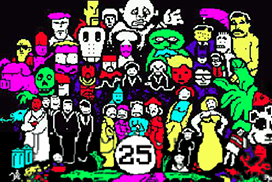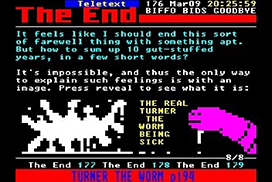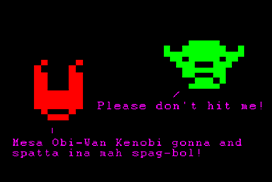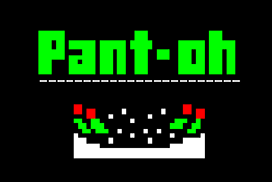
Grumble feature enabled
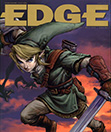
|
Kilroy was here
Edge #150, June 2005
Forget the four horsemen of the Apocalypse - Famine, Pestilence, War and whatshisname (Herpes? Binge Drinking? Janet Jackson's Boobie?) - you know things are bad when Bono gallops over with his sword of self-righteousness. I have a theory that, as the world ends and the sun swallows the earth, Bono will totter into view to reassure our boiling descendants that he's going to sort everything out moments before a solar flare fries the cocksure little leprechaun.
As I pen this column, beleaguered Tomb Raider publisher Eidos is considering a buyout bid from Elevation Partners, a California-based venture capital group which counts the thumb- sized Irish crooner among its directors. If the bid is successful it will mean that one of the last global-scale British publishers will be owned by a company based in San Francisco.
Fortunately, Elevation isn't the only company with its eyes on Lara Croft's assets (geddit?). Also bidding for Eidos is rival British publisher SCi, presenting us with nothing less than a trans-Atlantic tussle for the very trousers of the British games industry.
Our domestic games industry is apparently making more money than British TV or film, primarily because so much British software is shifted overseas. There are, we are told, 7.5 per cent more people employed in the UK games industry today than there were in 2000, albeit smeared between six per cent fewer developers.
However, if you can't argue with the success of, say, the Scotland-developed GTA series, neither could you argue that San Andreas is a particularly British style of game. It perhaps wouldn't go down so well in Hotdogsville, Iowa, if it was full of frantically texting chavs, but isn't it a shame that international success comes at the expense of our national identity?
If I look back to the games I loved when I was younger - Trashman, Everyone's A Wally, Skool Daze, Jack The Nipper et al - they could never have been created in America or Japan. They were dripping with the very texture of our green and pleasant land; all red postboxes, and fish and chips, and scarlet-cheeked bobbies. Yet making a game feel British isn't merely about iconography - it's something more intangible. Something you won't find in Resident Evil 4, or Half-Life 2, or - let's face it - The Getaway (or, as I like to call it, "Get It Away From Me").
If you pitched a game like Skool Daze to a publisher in 2005 they would literally spit in your face. Firstly, because it doesn't resemble any other game on the market, and secondly because it wouldn't appeal to their global demographic, as calculated by Super Marketingbot V4-004. Doubtless it'd have an even cooler reception in the wake of the dismal overseas performance of The Getaway: Black Monday, which will no doubt be blamed on the Mockney setting, rather than the po-faced, clichéd storyline, and abysmal design.
What I loved about Skool Daze wasn't that it had compelling gameplay or fantastic graphics, but that it spoke to me. It reflected some aspect of my life as a pre-teen boy in early-'80s UK. From the wall bars in the hall to the routine of the school assembly, I recognised it as my world. But more than that, on some subconscious level I must have recognised it as a product of my environment - the unpretentious humour was strictly British. Do any of today's games speak to their audience in quite the same way? Will Without Warning (from the team behind the cod-British Tomb Raider), or Wipeout Pure, or Cold Winter, or any number of so-called 'British' games prove comfortingly familiar to the youth of this mongrel nation? Or will they merely play it safe, showcasing designs meant to appeal to Jim-Bob Chewgrit III from Appleseed, USA?
Far be it for me to come across like Robert Kilroy-Silk, but it saddens me to see our sense of what makes us unique being eroded. It depresses me further still to see this country's game creators forced to suppress creativity in order to pander to an intercontinental market.
We are probably the last generation to have grown up filtering foreign influences through a sticky gauze of our own pop cultural bedrock - Rentaghost, and the Beano, and Grange Hill et al. In a world where the internet, and Cartoon sodding Network, with its wall-to-wall foreign cartoons, maintain a stranglehold on our children's psyches, our cultural touchstones are becoming the same as those of American youth. Consequently, we should be doing whatever we can to keep hold of the more singular elements of our cultural identity. In fact, with gaming being an ever-more-popular aspect of British youth culture, it's more important than ever that our games reflect our way of life.
To use a TV analogy, UK studios aren't trying to make the next Benny Hill or Monty Python - they're trying to make Saturday Night Live and Friends. It seems a shame we can no longer look inward for inspiration. Then again, when our own prime minister practically walks around wearing cowboy boots, and punctuates Question Time by firing a rifle in the air, and shouting "Yee-haw!", what hope do we have?
Mr Biffo co-founded Digitiser, Channel 4's Teletext-based videogames section, and now writes mainly for television
Do you know of any important moments from the annals of Digi history that have been omitted? If so, then mail me (superpage58@gmail.com) right now, man. Credit will be duly given for anything that gets put up.





